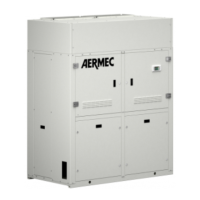20 - EN
NLC
EN
NLC_HA/HE cod: 4037315_01
Any cleaning operations are forbidden until the
unit has been disconnected from the electrical
power supply mains
1
Make sure there is no voltage before operating.
Periodic maintenance is essential to maintain the
unit in perfect working order under the functional
as well as the energetic aspect.
• Water circuit filling
• Water filter cleaning (NOT SUPPLIED)
• Flow switch control (NOT SUPPLIED)
• The absence of air in the circuit (bleeding)
• That the water flow rate to the evaporator is
always constant
• The condition of the hydraulic piping thermal
insulation
• Where applicable, the percentage of glycol
• The efficiency of safety devices
• The electrical power supply voltage
• The electrical power absorption
• The connections are tight
• The operation of the compressor casing
resistance
• Compressor conditions
• Efficiency of the plate-type exchanger
resistance
• Work pressure
• Leak test for checking the water tightness of
the cooling circuit
• Operation of high and low pressure switches
• Carry out the necessary checks on the filter-
drier to check its efficiency.
the
compressors and the electrical box, and the
exterior panelling of the unit. If they are
poorly tightened, they produce abnormal
noise and vibrations
The NLC units are filled with R410A gas and
inspected in the factory. Under normal conditions,
no Technical Assistance Service operation is
needed for checking the refrigerant gas. Over
time, however, small leaks of refrigerant may
arise draining the circuit, causing the appliance to
malfunction. In these cases, the refrigerant leakage
points should be found and repaired, and the
refrigerant load should be replenished , operating
in compliance with Law 28 December 1993 no. 549.
The disposal of the unit should be carried out
according to the rules in force in the various
countries.
WARNING
It is advisable to keep a machine booklet (not
supplied, but the responsibility of the user), in order
to keep track of the operations carried out on the
unit. In this way, it will be much easier to organise the
operations properly and facilitate troubleshooting.
In the booklet, write down date, type of operation
carried out (regular maintenance, inspection or
repair), description of the operation, measures
taken
WARNING

